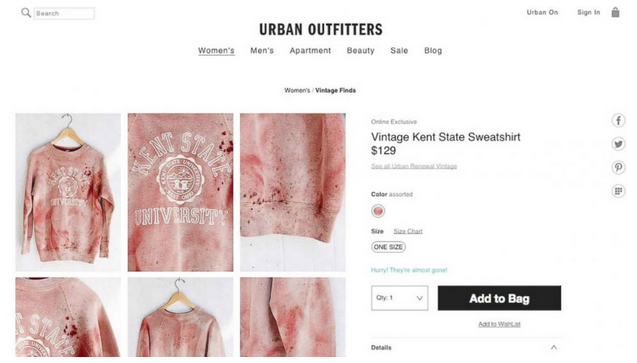![Urban Outfitters took down a controversial “Vintage Kent State Sweatshirt” days after its release on their online shop. [Urban Outfitters]](http://www.jstudentboard.com/reporter/wp-content/uploads/2014/10/JSR_Oct18_Outfitters-300x170.jpg)
People have voiced their strong disapproval of the design, which serves as an undeniable reminder of the 1970 shooting at Kent State by the Ohio National Guard that killed four students and injured nine others during a protest over the Vietnam War. Yet this is not the first time an incident like this has occurred. Urban Outfitters is notorious for its past mockery of weight problems and drug abuse on t-shirts and sweatshirts.
In 2012, Urban Outfitters found itself under fire for selling a t-shirt with a star that looked almost too accurately like the Star of David patches German Jews were forced to wear under the Nazi regime. Before this, in 2010, Urban Outfitters apologized for setting a color combination description for a shirt as “Obama/Black.” Over the years, the company has continued to be caught up in controversies over products mocking or promoting anorexia, alcoholism, and the use of illegal substances.
In response to this particular case, Urban Outfitters stated, “It was never our intention to allude to the tragic events that took place at Kent State in 1970 and we are extremely saddened that this item was perceived as such.”
However, many people question the reason for the initial distribution, which should’ve been stopped in the first place. Urban Outfitters says that “[the red stains] are [caused by] discoloration from the original shade of the shirt and the holes are from natural wear and fray,” yet many people question the legitimacy of this statement due to the uncanny resemblance of the stains to faux blood and the presence of the logo of the only US university where students have been killed by federal troops.
Whitney High School senior Jessica Kang, in an interview with JSR, said, “The sweatshirt is undeniably a terrible piece that alludes with no respect to past sensitive events. I find myself shopping at Urban Outfitters quite frequently for their unique pieces but mistakes like this can’t be ignored and really brings Urban Outfitters a step closer to losing me as an avid customer.”
Through the release of shirts and sweaters mocking past tragic events and heavy social issues, clothing brands have warranted a negative response of outrage from citizens every time social media has facilitated the spread of these endeavors. These controversial pieces of clothing show insensitivity that can’t be ignored and the criticism that follows each controversy is justifiable.

